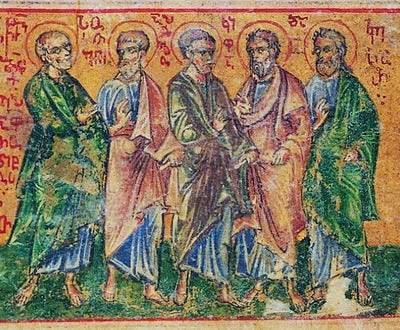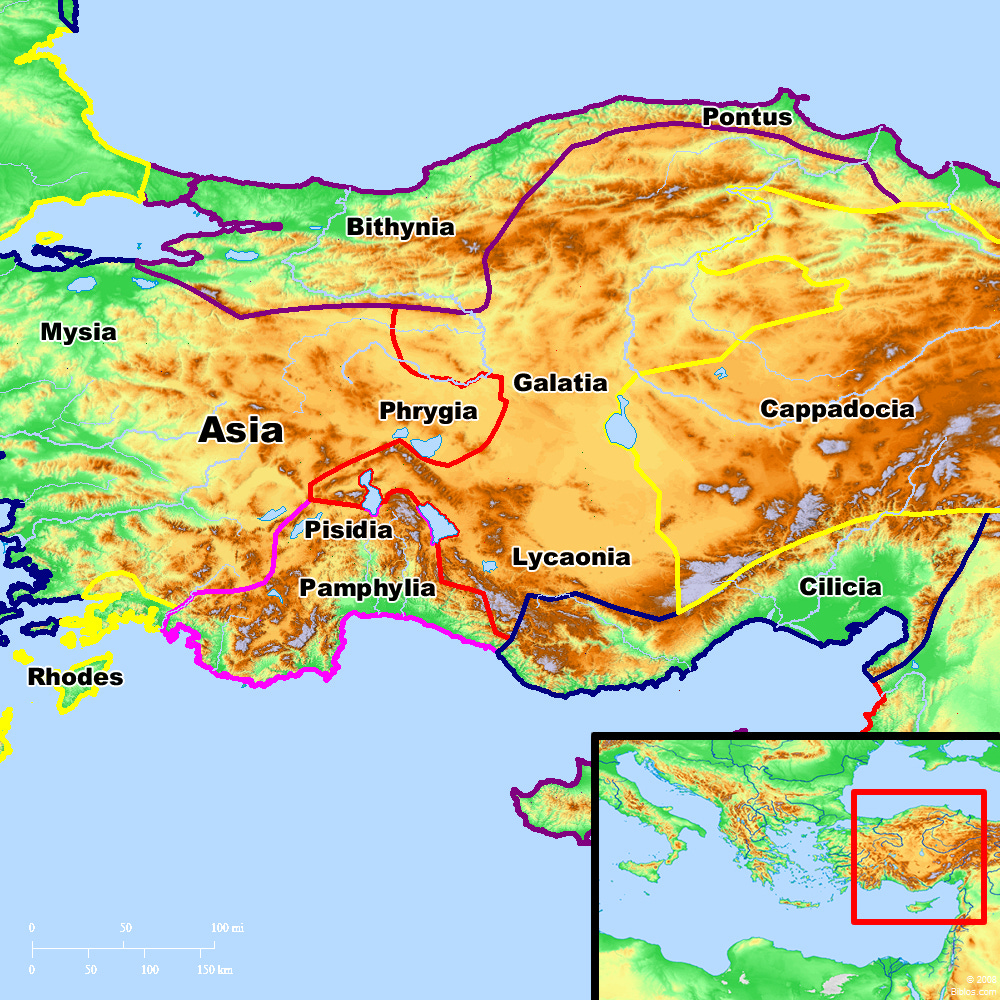A Study of Acts: The Third Missionary Journey Begins, Apollos Appears
Acts 18: 23-28; 1 Corinthians 1:12-13 - Learning about the Lord and understanding scripture is more than a lifetime’s work! Always be humble and heed and listen to those who know more.
“And having spent some time there, he left and passed successively through the Galatian region and Phrygia, strengthening all the disciples. Now a Jew named Apollos, an Alexandrian by birth, an eloquent man, came to Ephesus; and he was mighty in the Scriptures. This man had been instructed in the way of the Lord; and being fervent in spirit, he was speaking and teaching accurately the things concerning Jesus, being acquainted only with the baptism of John; and he began to speak out boldly in the synagogue. But when Priscilla and Aquila heard him, they took him aside and explained to him the way of God more accurately. And when he wanted to go across to Achaia, the brethren encouraged him and wrote to the disciples to welcome him; and when he had arrived, he greatly helped those who had believed through grace, for he powerfully refuted the Jews in public, demonstrating by the Scriptures that Jesus was the Christ.”
Acts 18:23-28 NASB1995
The image at the top is a fifteenth-century Russian Orthodox icon with (from left to right) Epaphroditus, Sosthenes, Apollos, Cephas and Caesar.
In this last passage from Acts 18, Paul begins his third missionary journey by first passing through the Galatia region and Phrygia, strengthening all of the disciples. He has spent “some time” in Antioch before setting out, but no one is sure if this meant days, months or even a year. These are the same areas that he visited on the first missionary journey with Barnabas. Here’s a map of the regions he visited first, from Bibleatlas.org:
So while Paul is in this region, Luke shifts the scene to Ephesus and we are introduced to a new character named Apollos. Apollos is a believer (although he needs more training in the life of Jesus) who is from Alexandria, Egypt, has come to Ephesus, and is considered quite eloquent and was mighty in the Scriptures. It appears that he knew the story of the coming of the Messiah from the work and words of John the Baptist. This story about Apollos from Enduring Word is quite good:
A certain Jew named Apollos: As Paul did his work in Galatia and Phrygia, this man named Apollos came from Alexandria to Ephesus. By many measures, he was a remarkable man.
Apollos was an eloquent man.
Apollos was mighty in the Scriptures.
Apollos had been instructed in the way of the Lord.
Apollos was fervent in spirit. Literally this means, “to boil in the spirit” with the idea of “bubbling over with enthusiasm.” (David Williams)
Apollos spoke and taught accurately the things of the Lord.
It seems Apollos (like many in his day) was a missionary called by God alone, because we have no indication that he was sent or commissioned by any specific congregation or apostle. He simply came to Ephesus.
Though he knew only the baptism of John: We see again that the reputation and work of John the Baptist was widely known throughout the Jews of the Roman Empire, reaching here as far as Alexandria.
Because Apollos knew of the work of John the Baptist, it is likely that he preached that the Messiah had come and we must repent and respond to Jesus, but he probably had little knowledge of the full person and work of Jesus Christ.
“Apollos was a well-educated and also a well-traveled man. We can imagine that in his youth he had gone to Jerusalem, especially if he had an interest in the Old Testament, and while there had come under the influence of the preaching of John the Baptist.” (James Montgomery Boice )
So he began to speak boldly in the synagogue: Apollos didn’t know much about Jesus, but what he did know was taught accurately – and with bold passion. He didn’t know much about Jesus, but what he did know genuinely excited him.
“What is mentioned here is ‘fervor,’ and this means not merely skill on his part but conviction based on something deeply embedded in his heart.” (James Montgomery Boice)
Some commentary that I read hints that Apollos might have written the book of Hebrews, but this is not well-substantiated. He did become a long-time colleague of Paul’s and was mentioned in some epistles. He must have been quite charismatic because a “cult” following Apollos sprang up in Corinth:
“Now I mean this, that each one of you is saying, “I am of Paul,” and “I of Apollos,” and “I of Cephas,” and “I of Christ.” Has Christ been divided? Paul was not crucified for you, was he? Or were you baptized in the name of Paul?”
1 Corinthians 1:12-13 NASB1995

Priscilla and Aquila heard Apollos speaking boldly in the synagogue and they took him aside to explain the way of God more accurately. Now it’s pretty certain that Priscilla and Aquila were Christians, but they were also Jews, so perhaps it’s not surprising that they attended the synagogue. Apollos is not prideful, because he willingly takes to this instruction from two people who are very close to Paul and and have learned about Paul’s special knowledge of the Lord.
I always invite readers to challenge us if they think we erred scripturally in our devotional studies. If it is a doctrinal difference, however, then note that I stand firmly on the Protestant side of the fence. I pray that I am always humble enough to know when to correct my interpretations or respond to instruction.
Apollos wanted to travel across to Achaia (probably Corinth) and the brethren greatly encouraged him and wrote to the disciples there to welcome him. When he arrived there, he greatly helped those who had believed through grace, powerfully refuting the Jews in public and demonstrating by the Scriptures that Jesus is the Christ. I find this so intriguing that suddenly here is another fervent believer, from Alexandria, who wants to travel around and bring new believers to Christ and reason with those in the synagogues. I wonder how many of these itinerant, eager, yet erudite, evangelists were floating around in those days and how many were selected by the Lord? We know about Paul’s story, but there are probably other stories just like his (fortunately, Luke documented the story of Apollos). Fun and fascinating to think about!
My next devotional examines Acts 19:1-7 - Paul arrives in Ephesus and finds some disciples.
Heaven on Wheels Daily Prayer:
Dear Lord - Please sustain and guide me every time I write one of these devotionals so that I am speaking the truth about Your Word. Amen.
Scripture quotations taken from the (NASB®) New American Standard Bible®, Copyright © 1960, 1971, 1977, 1995 by The Lockman Foundation. Used by permission. All rights reserved. lockman.org
The Bibleatlas.org was accessed on 12/18/2024 to review the map for Phrygia.
Commentary from Enduring Word by David Guzik is used with written permission.




